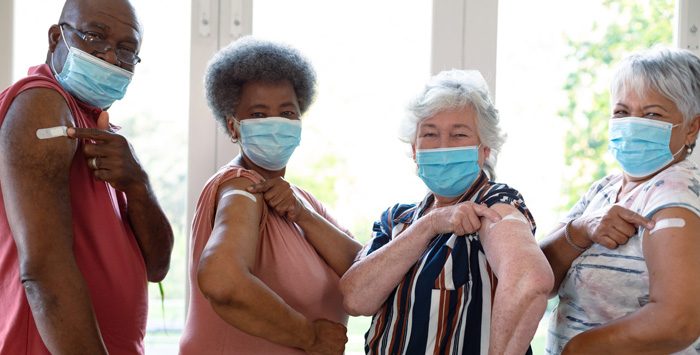Does Medicare cover the COVID vaccine?
Yes, Medicare covers COVID-19 vaccines 100%. Specifically, Medicare Part B covers the primary vaccine series (your first set of COVID-19 vaccines) and any booster shots recommended afterward by the Advisory Committee on Immunization Practices (ACIP) and the Centers for Disease Control and Prevention (CDC). How many shots you receive in your primary series depends on your age and whether or not you are immunocompromised, i.e., you have a weakened immune system.
The Centers for Disease Control continues to recommend COVID-19 vaccination for anyone 6 months and older. Even though the public health emergency ended in May 2023, COVID continues to cause serious infections. The virus has resulted in thousands of hospitalizations and deaths since that time.
Is the COVID vaccine free for everyone?
COVID-19 vaccines are free if you’re enrolled in Medicare, whether you are enrolled in Original (Traditional) Medicare or a Medicare Advantage plan. That means you will not pay a deductible, coinsurance, or copay for the vaccine itself, administration of the vaccine, or the visit for the vaccine (as long as the visit was not for other reasons). For example, if you got a COVID-19 vaccine during a visit you had to follow-up on your blood pressure, you could still have out-of-pocket costs for your visit but the vaccine and its administration would be free.
(Note that if you have Original Medicare, you just need to use a doctor or pharmacy that accepts Medicare, but if you’re on a Medicare Advantage plan you will likely need to use a doctor or pharmacy that’s in-network with your plan.)
Medicaid also covers COVID vaccines, just as it covers any vaccine recommended by the CDC’s Advisory Committee on Immunization Practices. However, access to free COVID vaccines for limited-benefit Medicaid enrollees varies by state. (Examples of limited-benefit Medicaid programs include people who are eligible only for family planning benefits, or only tuberculosis-related benefits.)
Under most private health plans, your COVID vaccine is free to you if you remain in-network. However, there could be costs for getting your vaccine through an out-of-network provider. If you have grandfathered private health insurance (meaning the plan was already in effect when the ACA was signed into law in March 2010), the policy can impose out-of-pocket costs for covered vaccines (Grandfathered plans are not required to cover vaccines at all.)
There is no guarantee that uninsured adults can access free vaccines, although many states have programs to facilitate this. And children can access vaccines via the Vaccines for Children Program. This includes children 18 and younger who are eligible for Medicaid, are uninsured, are underinsured – if they get their vaccination at a Federally Qualified Health Center (FQHC) or Rural Health Center (RHC), or who are American Indian or Alaskan Native (AI/AN). It is possible that there could be administrative fees for these vaccines, although no child can be denied a vaccine if they cannot afford to pay.
Which COVID vaccines does Medicare cover?
Medicare Part B only covers vaccines that have been approved and authorized by the FDA. As of 2025, that included three vaccines. The Pfizer and Moderna vaccines, brand names Comirnaty and Spikevax respectively, have been granted full FDA approval. The Novavax vaccine remains under an emergency use authorization. All three are covered for Medicare beneficiaries.
For the primary series, Medicare covers all three vaccines and all recommended doses based on your age and health status. The number of vaccines required in the primary series has changed over time. As of 2025, someone 12 years or older who has never been vaccinated against COVID-19 can get either one dose of the Pfizer or Moderna vaccine or one dose of the Novavax vaccine with a second Novavax dose in three to eight weeks. Depending on the vaccine, people who are younger than 12 years old or who are immunocompromised may require more doses in their primary series than people who are not immunocompromised.
The majority of vaccinated people in the U.S. have completed a primary series with Pfizer or Moderna, mainly because Novavax was not authorized by the FDA until 2022. However, people can choose any of the three vaccine booster options regardless of which vaccine they got in the primary series. Please refer to CDC guidelines for booster recommendations based on age and health status.
Does Medicare cover COVID booster shots?
Medicare covers the cost of COVID booster shots, too. These shots are intended to prevent or decrease the severity of a COVID infection caused by new variants of the virus that have occurred since your primary vaccine series. It is important to stay tuned to the CDC and the Advisory Committee on Immunization Practices (ACIP) for the most up-to-date recommendations.
If you are immunocompromised – meaning you have a weak immune system based on a medical condition or from medications you take – you may need booster shots more frequently. The frequency will depend on the type of COVID vaccine you received in the past and how many doses you’ve received so far. Speak with your healthcare provider for guidance.
Does Medicare pay for COVID tests?
Original Medicare does not cover at-home COVID tests. It is possible that at-home tests could be covered as a supplemental benefit if you are on a Medicare Advantage plan. You will need to check with your plan for details.
The government periodically offers free at-home tests to the public. Here are some additional resources where you can check to see if any free COVID-19 tests are available.
COVID testing remains free for everyone covered by Medicare when it is ordered by a healthcare provider and is performed in a laboratory. In that case, the test could be done at a clinic, a hospital, a laboratory facility, a medical office, or a pharmacy.
The information in this article is for informational purposes only and does not substitute professional medical advice. Always seek the advice of your physician.
Tanya Feke, M.D. is a licensed, board-certified family physician living in New Hampshire. As a practicing primary care physician in Connecticut and an urgent care physician in New Hampshire, she saw first-hand how Medicare impacted her patients. In recent years, her career path has shifted to consultant work with a focus on utilization review and medical necessity compliance.
Dr. Feke is an expert in the field, having Medicare experience on the frontlines with both patients and hospital systems. To educate the public about ongoing issues with the program, she authored Medicare Essentials: A Physician Insider Reveals the Fine Print. Her analysis of Medicare issues is frequently referenced by the media and she is a contributor to multiple online publications. As founder of Diagnosis Life, LLC, she also posts regular content about health and wellness to her site at diagnosislife.com.
Footnotes
Tags: COVID-19, vaccinations



